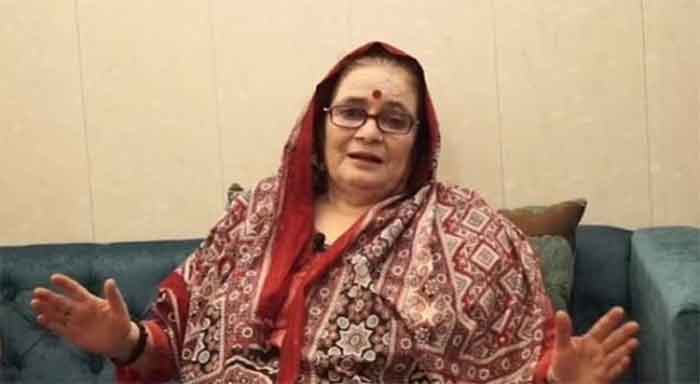
Padma Sachdev, a great writer and upholder of human values, breathed her last at Mumbai on August 4 at the age of 81. She leaves behind her husband, Surinder Singh, a great singer of the famous Singh Bandhu duo, and daughter Meeta Sachdev. Several eminent persons including Karan Singh and Lata Mangeshkar, with whom she shared a very afffectionate and long relationship, have paid rich tributes to her.
Padma Sachdev has been frequently hailed as mother of modern Dogri literature, but with due humility she herself referred to herself as a daughter who sought to serve Dogri language. Apart from her valuable writings in this language, her work of bringing Dogri folklore and songs to prominence has been considered to be of great value. She also collaborated with Lata Mangeshkar to create an album of Dogri music which is much cherished.
However her great contribution to Dogri language should not lead to neglect to her great contributions to Hindi literature, to which she contributed in many forms including fiction, poetry, memoirs, interviews, translations and articles. She was highly regarded by some of the most senior poets and writers of Hindi including Ramdhari Singh Dinkar and Dharamvir Bharati. In fact Dinkar commented after reading some of her poems that he himself has much to learn from Padma’s ‘real’ and sincere poetry. Old-timers still cherish the memory of Padma’s writings in Dharamyug and other leading magazines of Hindi. In addition she wrote in Punjabi and Urdu as well. She was familiar with several languages including Kashmiri and Sanskrit. Her father Jai Dev Badu , who died during partition, was reputed as a great Sanskrit scholar of Jammu. Her friend Pushpesh Pant in his tribute has called Padma a leading light of Dogri-Kashmiri-Punjabi heritage.
Padma spent her early days in Jammu, while spending much of her later days in Mumbai and Delhi. She contributed as a broadcaster to radio stations in Jammu and Mumbai. Her memories of early life in Jammu contributed to many memorable writings.
Her leading books include Meri Kavita, Mere Geet ( which received the Sahitya Academy Award in her early years), Tawi Te Chanhan ( Tawi and Chenab Rivers), Niheriya Galiyan ( Dark Lanes, Diwankhana (Interviews), Boond Bawdi ( memoirs) and In Bin. She wrote against feudal values, acknowledged the important contribution of domestic helps, looked sympathetically at memories of a taxi driver in Mumbai and revealed interesting less-known aspects of well-known personaities but her more consistent contribution in her writings was of upholding the dignity of women and of conveying deeply human values. She was honored by many awards including Saraswati Samman, Kabir Samman and Padma Shri.
She had limited but interesting engagement with the film industry , mainly in terms of writing the lyrics of a few film songs, including some much remembered ones like Ye neer kahan se barse hain.
While all these achievements of Padma Sachdev are very important, for the very wide circle of her friends, in Jammu and Delhi, in Mumbai and elsewhere, even these are surpassed by very warm, pleasant memories of personal inter-actions. Her husband Surinder Singh also contributed much to this. Outwardly Surinder and Padma appeared to be very different persons, particularly to those who met them for the first time, and perhaps they were too in some ways, but they formed a very great relationship, together taking happiness and joy to many, many people. Leaving behind memories and thoughts of distress and difficulties, Padma was capable of bringing joy and warmth in the lives of many friends including those who met her for very short periods.
I too was among the beneficiaries of her exceptional capability of transmitting joy and warmth in a very short time. Circumstances brought us together in some meetings, and she did not lose much time to invite me, a struggling young writer, to her home. Don’t forget to bring your wife along, she reminded me more than once.
When I landed at her Mandi house home ( in Delhi ) with my wife Madhu for our first real conversation, within 15 minutes we were entirely at home and the converation had reached a stage where she was telling us that we should go ahead and have a second child!
It is this spontaneous warmth and closeness in relationships that came so naturally and effortlessly to her, which will be cherished most and missed most by her wide circle of friends. At a wider level, of course, it is the world of Dogri, Hindi and Indian literature which has lost a stalwart whose many-sided invaluable contributions will be remembered and valued for a very long time.
Bharat Dogra is a journalist and author.















































